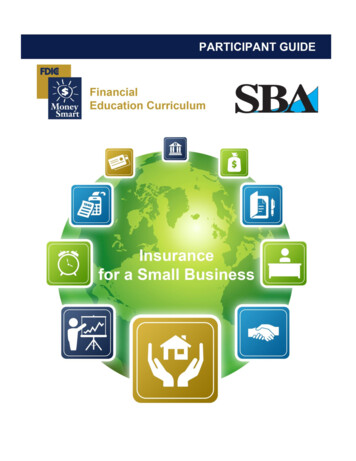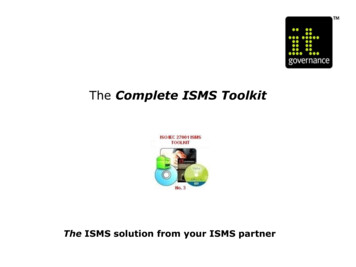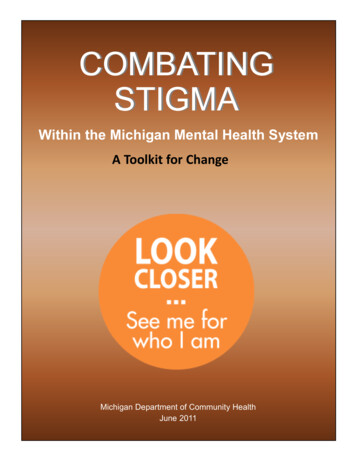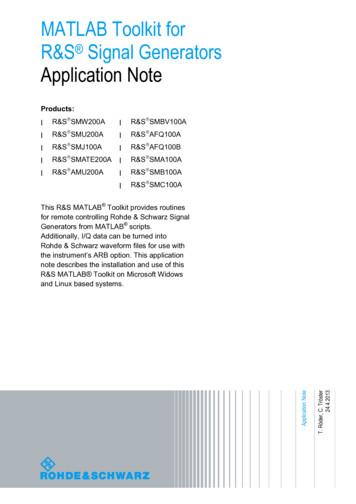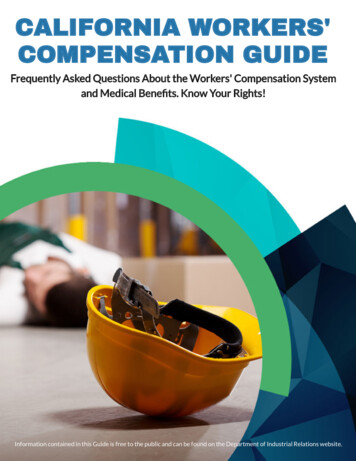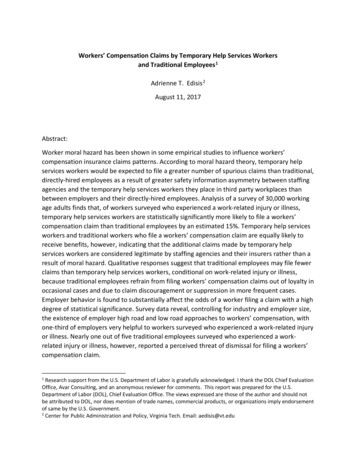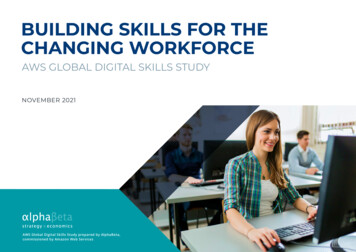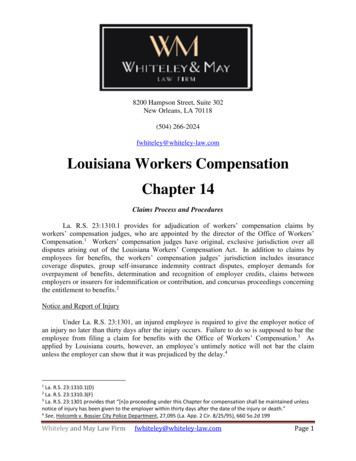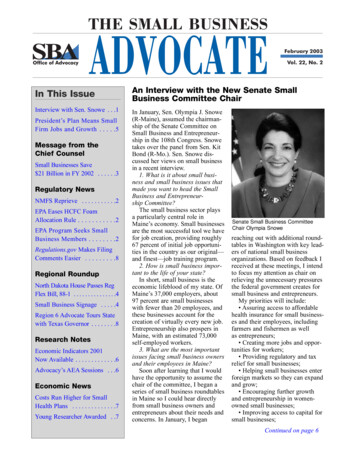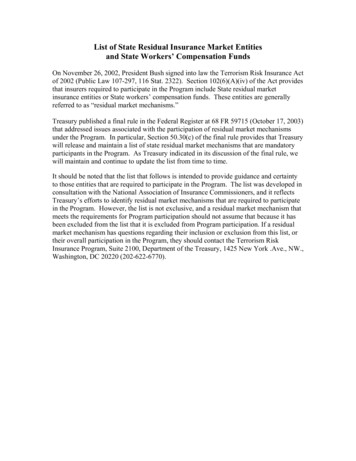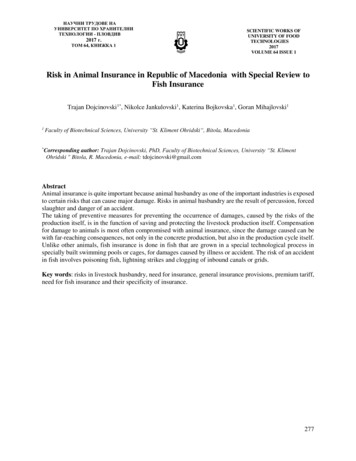
Transcription
Workers Insurance:Small Business ToolkitA toolkit to help small businesses navigate workers insurance icareTM Insurance and Care NSW 20201 of 13Workers Insurance: Small Business Toolkit
Table of contentsForward 3icare at a glance 4Why do I need workers insurance? 4How does icare support you? 4How does icare benefit me? 4Who manages my claims 5How is my premium calculated? 5Why injury prevention matters in small business 5Tools and resources to support you with managing workers insurance 6What to do if an injury occurs 7Post-injury checklist: Employer to worker 7Definitions 8Case manager / Claims Advisor 8Certificate of capacity or fitness 8Claims Excess Payment 8Complaint 8Independent Medical Examiners 8Declaration of Wages 8Employer 9Exempt employer 9Injury Management Plan (‘IMP’) 9Insurance and Care (icare) 9Job task analysis 9Medical Support Panel 9Nominated Treating Doctor (‘NTD’) 10Pre-injury Average Weekly Earnings (‘PIAWE’) 10Permanent impairment 10Premiums 10Register of injury 10Return to work program 10Safework NSW 10Small business employer 11State Insurance Regulatory Authority (SIRA) 11Suitable work 11Weekly payments 11Worker 11Workers compensation policy 11Workers Compensation Industry Classification (WIC) 12Workplace Rehabilitation provider (‘Rehab provider’) 12 icareTM Insurance and Care NSW 20202 of 13Workers Insurance: Small Business Toolkit
ForwardWorkers Compensation can be complex. For small business, you want to spend timefocusing on the things that are important to the success of your business.Small business plays a crucial role in the NSW economy and across the country. With smallbusinesses accounting for 35% of Australia’s gross domestic profit and employing 44% ofAustralia’s workforce, it is a vibrant and amazing sector. To support you, we’ve created thistoolkit to help navigate the complexities of workers compensation insurance. Enclosed you’llfind resources to navigate the system and to help prevent injuries. We also know that havinga workers compensation claim can have a significant impact on a small business, and withthis in mind, we’re here to support you and your workers when they have been injured onthe job.Thanks for your support in creating safer workplaces. We are regularly developing new toolsand resources to support small business. For the latest information you can visit us at theindustry hub: www.icare.nsw.gov.au/ihubGeoff HendersonGeneral Manager – Employer EngagementSmall businesses are critical to the NSW and national economy as well as our localcommunities. Given the importance of small business and the critical role of their workforceto their success, it’s important that employers have the support they need to assist inensuring the health and safety of their workers.Workers compensation insurance is there to protect small business in the event of a workrelated injury or illness. Having the right tools and resources to prevent injuries and thesupport to achieve effective return to work outcomes is vital in ensuring the success ofsmall business.I encourage you to use this toolkit to help you not only navigate workers insurance but alsoto make it work for you.We thank you for your commitment to creating safe and healthy workplaces across NSW.Chris LamontNSW Small Business Commissioner icareTM Insurance and Care NSW 20203 of 13Workers Insurance: Small Business Toolkit
icare at a glanceWhy do I need workers insurance?Workers compensation insurance protects small business employers in the event of a work-related injuryor illness. If an employee is injured at work or because of work, you are responsible for their recovery andassociated costs, such as medical costs.Having workers insurance can help pay the bills related to the workplace injury, so you can focus onkeeping your workers safe and your business moving.To protect business owners and their workers, taking out a workers compensation insurance policy iscompulsory for all employers in NSW except for ‘exempt employers’ (see Definitions). The policy willinsure your business against costs associated with supporting your injured worker and may include: weekly compensation benefits, e.g. paying all or a portion of their wage medical and hospital expenses, e.g. surgery expenses rehabilitation services, e.g. rehabilitation providers like physiotherapists certain personal items, e.g. clothing or spectacles, if damaged in a work-related accident lump sum payment for death or permanent impairment.We know that small business plays an integral role in the NSW economy and so having a policy with icareensures your business keeps moving if an employee is injured or ill due to work.TIP: If your average performance premium (that’s total wages multiplied by your industry rate)is 30,000 or less, you’re considered a small employer for workers insurance purposes.How does icare support you?icare NSW provides insurance and care services to statutory authorities and people with injuries undervarious compensation schemes.At icare, we deliver best-in-class insurance and care services to the businesses, people and communitiesof NSW.Whether a person is severely injured in the workplace or on our roads, icare supports their long-term careneeds to improve quality of life, including helping people return to work.We provide workers compensation insurance to more than 326,000 public and private sector employers inNSW and their 3.6 million employees.We also insure builders and homeowners, provide treatment and care to people severely injured on NSWroads and protect more than 193 billion of NSW Government assets, including the Sydney Opera Houseand the Sydney Harbour Bridge, schools and hospitals.How does icare benefit me?We understand that to keep your business moving, your workers’ health and wellbeing are priority. Wework closely with small business employers to ensure you have the best-in-class support and service atevery stage of your workers insurance journey.DID YOU KNOW:Small businesses account for 94% of NSW businesses that have taken out a workers compensationinsurance policy with icare. icareTM Insurance and Care NSW 20204 of 13Workers Insurance: Small Business Toolkit
Small business employers have access to a range of specialists at icare who will assist with all your claimneeds or requirements, including: policy underwriting injury prevention claims lodgement and management; and return to work.We want every small business in NSW to feel confident that it has a safe and healthy workplace andmanages injuries effectively.Who manages my claims?icare is the largest workers compensation insurer in NSW, protecting around 90 per cent of the NSWworkforce. To ensure all our customers are supported, we have a range of insurance agents that manageclaims on our behalf. For small business claims, they are managed through an insurance agent called EML.EML support small business employers with managing claims, deliver return-to-work outcomes and help toimprove work health safety.How is my premium calculated?Your premium will be calculated in accordance with the Workers Compensation Market Practice andPremium Guidelines, and is based on several factors: the wages paid to your workers the type of business or industrial activity your organisation undertakes. Your industry will have aclassification rating which is based on the performance of all employers in that particular classification.All premiums are calculated by taking your industry classification rate and multiplying it with how muchyour business pays in wages. This is called average performance premium.If your premium is 30,000 or less, you’re considered a small employer and your premium remainsunaffected by claims costs if a worker is injured.Here are some steps you should take to support your workers: Prevention is better than cure – keep your workplace and workers safe Make a claim as soon as possible – notify EML within 48 hours of the injury Work with us and support your worker to recover at work or return to work quickly Promote an injury prevention culture in the workplaceWhy injury prevention matters in small businessAs a small business owner, you are responsible for the principal decision making associated with operatingyour business, such as managing finances, marketing and sales, which can be overwhelming at times.With so many responsibilities involved in running a business, your workers’ health and safety areparamount because if they perform at their best, so does your business.Being prepared and having the right tools and resources to prevent injuries has a significant impact on asmall business. With a number of tools and resources available to you, make a commitment to provide ahealthy and safe working environment for you and your employees.For more information, d-resources icareTM Insurance and Care NSW 20205 of 13Workers Insurance: Small Business Toolkit
Tools and resources to support you with managingworkers insuranceIndustry hub (ihub): A single resource to help employers navigate injury management and improvethe safety and wellbeing of their workforce.www.icare.nsw.gov.au/ihubicare virtual education: The icare Mobile Engagement Team provide tailored education and trainingthrough online methods such as webinars, webcasts and recorded sessions. obile-engagement-team-eventsicare website: Get the latest workers insurance news, helpful tools and more: www.icare.nsw.gov.auPremium calculation: Find out how your premium is calculated ll-employer/Get a policy quote: Take out a policy or get an estimate of your premium Employer look up: Search for employers registered with icare: employerlookup.icare.nsw.gov.au/Downloadable resources to help small business employers: At work, you can recover better flyer: If you get injured at work, follow these steps to get thesupport you need and recover faster. 5 ways to wellbeing: Every mind matters, the five ways to wellbeing are through connection,being active, taking notice, to keep learning and to give. How employers can engage workers after a psychological injury checklist: A 12 week checklistfor employers engaging workers following a psychological injury. Checklist for lodgement of a Workers Insurance claim: This is a checklist for a lodgement of aWorkers Insurance claim. Service Catalogue for Small Business Employers: This document outlines a full list of the standardservices included in your premium, which you can expect from icare and our Claims ServiceProviders.If you’re an employer in the health, transport, construction or manufacturing industry, you canaccess a range of articles and resources on topics and trends specific to your industry, to help youmake better informed decisions about workers insurance and to help keep your workplace safer. rs/industry-hub/your-industry See more helpful information in our tools and resources section rs/industry-hub/tools-and-resourcesContact us:Policy enquiries Call: 13 44 22 (M-F, 7am-7pm) Email: wisupport@icare.nsw.gov.auNew claim notification Call: 13 77 22 (M-F, 7am-7pm) Email: newpiclaims@icare.nsw.gov.auWeb: Workers Insurance PortalEML claims enquiries Call: 13 77 22 (M-F, 7am-7pm) Email: newpiclaims@icare.nsw.gov.auicare offices:Sydney321 Kent St, Sydney NSW 2000 icareTM Insurance and Care NSW 2020ParramattaNewcastle56 Station Street East,Parramatta NSW 2150Level 6, 18 Honeysuckle Drive,Newcastle NSW 23006 of 13Workers Insurance: Small Business Toolkit
What to do if an injury occursPost-injury checklist: Employer to workerA checklist to support employers with managing a work-related injury or illness, and having an effectivereturn to work planHave you made immediate contact withthe worker?YesNo, make immediate verbal contactHas appropriate first aid or treatmentsupport been provided?YesNo, coordinate treatment/injury supportYesNo, immediately contact SafeWork 13 10 50YesNo, complete register of injuryYesNo, report within 48 hoursIf the injury is considered ‘serious’ or‘dangerous’ or resulted in death, haveyou reported this to SafeWork NSW?Have you recorded the injury in theRegister of Injuries SafeWork NSW?Have you reported this incident/claimto your insurer EML?TIP: If the injury results in time off work – Pre-Injury Average Weekly Earnings (PIAWE) calculation is used.PIAWE is the earnings an injured worker will receive for a set period based on their pre-injury earnings.Click here for more information.Have recover at work discussions beenheld with the injured worker? (includingavailability of suitable duties)YesNo, immediately contact worker and discussAre you available to attend or dial intothe initial GP consultation? (*you can onlyattend or dial in with the worker’s consent)YesNo, ensure the worker has all information available tosupport suitable duties - including Job Task Analysisor position Description and available supportHave you been provided with the GP’sinitial certificate of capacity?YesNo, contact the worker and obtain a copyTIP: The certificate of capacity is used in the NSW workers compensation system to describe the natureof a worker’s injury/illness, their capacity for work and the treatment required for a safe and durablerecovery at/return to work. Find out moreHave you discussed the certificate ofcapacity in detail with the worker?YesNo, discuss with worker and gain a completeunderstanding of the injury diagnosis and treatment planHave you completed an agreed recover atwork plan with the worker?YesNo, discuss and complete plan withworker as soon as possible. If unfit forwork, gain detail on next GP review date.Have you maintained communication withthe worker and kept record of key dates/milestones and treatment activity (i.e. Dateof next medical/treatment appointment)?YesNo, make immediate contact withworker and gain updated detailsResources: Recover at work planning template Recover at Work Assist for Small Business Rehabilitation Providers icareTM Insurance and Care NSW 20207 of 13Workers Insurance: Small Business Toolkit
DefinitionsWorkers insurance is a complex environment, and you might come across terminology you are not familiarwith. To help you be better informed, below are common terms used in workers insurance.Case manager / Claims AdvisorThe case manager is the primary point of contact for the work injury claim for you, your worker and theirtreatment providers. They are responsible for: Coordinating the end-to-end process of a work injury claim Reviewing a work injury claim and acting on behalf of the insurer Development of an injury management plan Authorising ‘reasonably necessary’ treatment and other expenses Determining what payments a worker is entitled to, and ensuring these payments are receivedHelping employers meet their obligations to support the worker to recover at work.Certificate of capacity or fitnessA certificate of capacity is the primary communication tool used by your worker’s Nominated TreatingDoctor to communicate with you, the case manager or claims advisor and the worker. It will be used bythe case manager or claims advisor to: Assess your worker’s claim Determine whether the worker receives compensation payments Review and determine treatment, workplace rehabilitation and return to work strategies for the workerClaims Excess PaymentIf you don’t report a work-related injury within 5 days of becoming aware of the injury, you may berequired to pay a ‘claims excess payment’, which is equivalent to one week of the worker’s weeklypayments.ComplaintIf you have a complaint, you are encouraged to contact your claims manager in the first instance.Alternatively, you can call the icare Complaints Resolution Team on 13 99 22, or you can contact SIRA on 1310 50 with your enquiry or complaint.Independent Medical ExaminersAn independent medical examiner (IME) is a registered medical practitioner who is engaged to completean examination of your patient and provide a report. An IME report can contain assessments andrecommendations about: Your woker's work capacity Ongoing medical treatment and care needs, including recommendations for future treatment Permanent impairmentDeclaration of WagesTo help calculate your premiums, you need to declare the amount of wages paid within the year. You’rerequired to lodge a declaration at the end of your workers compensation insurance policy period bycompleting an Declaration of Actual Wages form. icareTM Insurance and Care NSW 20208 of 13Workers Insurance: Small Business Toolkit
EmployerAn employer is any person or business entity that employs or hires workers on a full time, part timeor casual basis, under an oral or written contract of service or training contract.Working directors of a corporation are considered employees of the corporation.Examples: a household who hires a babysitter or a nanny is an employer a farmer who hires a farmhand and provides accommodation and meals in lieu of wages to thefarmhand is an employerExempt employerYou are an exempt employer and not required to get an insurance policy if: you pay 7,500 or less in annual wages and; you don’t employ an apprentice or trainee and; you’re not a member of a group for premium purposes.Even if you are exempt, you still have the obligation to provide assistance with injury management andreturn to work. This includes notifying icare workers insurance on 13 77 22 of any workplace injuries.Injury Management Plan (‘IMP’)An Injury Management Plan (IMP) provides details of a worker’s return to work and recovery goals,including information about treatment. The IMP is developed by the claims advisor in conjunction with you,your worker, their nominated treating doctor and the extended health team.Insurance and Care NSW (icare)icare provides insurance and care services to statutory authorities and to people with injuries undervarious compensation schemes. This includes the Workers Compensation Nominal Insurer, providingworkers compensation to employers and workers in NSW.icare workers insurance acts for the Workers Compensation Nominal Insurer and engages external insurersto manage workers compensation claims on its behalf. These external insurers are: Allianz Australia Worker’s Compensation (NSW) Limited Employers Mutual NSW Limited GIO General Limited QBE Insurance Group LimitedJob task analysisJob task analysis (JTA) involves an examination and breakdown of the skills and demands specific to aparticular task, role or duties within the workplace.It consists of detailed description of the physical requirements of the role and includes such factors as thetask frequency and duration, environmental factors and the equipment required to complete a role.Medical Support PanelThe Medical Support Panel (MSP) is a panel of medical specialists with expertise in work injuries, whichprovide claims advisors with medical case support to fast-track decision-making. The MSP medicalspecialist review case information and make treatment and medical causation recommendations to theclaims advisor. icareTM Insurance and Care NSW 20209 of 13Workers Insurance: Small Business Toolkit
Nominated Treating Doctor (‘NTD’)Every workers compensation claim requires the worker to have a Nominated Treating Doctor (NTD). AGeneral Practitioner (GP) usually takes on this role. The NTD is responsible for the ongoing managementof a worker’s injury. Apart from assessing, diagnosing, treating and certifying patients, the role of the NTDincludes supporting the patient with their recovery at/return to work.Pre-injury Average Weekly Earnings (‘PIAWE’)If a worker is unable to perform their pre-injury job because of a work-related injury, any weeklycompensation that might be payable to them is calculated by reference to their Pre-injury Average WeeklyEarnings (PIAWE).PIAWE is generally the weekly average of a worker’s gross earnings over the 52 weeks prior to their dateof injury.Permanent impairmentIf your worker sustains a workplace injury or illness that is permanent in nature, then they can makea claim for permanent impairment, and may be entitled to receive a lump sum compensation payment.The worker must have a minimum level of permanent impairment to be eligible for permanent impairmentcompensation.PremiumsYour workers insurance premium is based on your industry, how much you pay in annual wages, and arange of other factors.Register of injuryEven if an injury doesn’t result in a workers compensation claim, you need to keep a record of whathappened. This is called a register of injuries. The register of injuries must be kept in a readily accessibleplace in the workplace.Return to work programA return to work program is the formal policy and procedures your business must have in place to helpinjured employees recover and return to work.It should outline your commitment to helping injured workers recover at work and/or return to work safelyand as soon as possible following a work-related injury or illness. Your return to work program must be: consistent with the Standard return to work program accessible and communicated appropriately to your workforce provided to any worker on request.Safework NSWSafeWork NSW is the workplace health and safety regulator (with the exception of mines and petroleumsites) for New South Wales. It focuses on harm prevention and improving the safety culture in NSWworkplaces. icareTM Insurance and Care NSW 202010 of 13Workers Insurance: Small Business Toolkit
Small business employerSmall business employers have less than 20 workers or have an average performance premium of 30,000or less per year1, and will often be single director companies and family businesses. Leaders of thesebusinesses are likely to be part of the day-to-day work and workplace.State Insurance Regulatory Authority (SIRA)The State Insurance Regulatory Authority (SIRA) is the NSW Government agency responsible forregulating the NSW workers compensation system.Suitable workIf a worker is not able to immediately return to their normal duties, an employer is obligated to identify ifsuitable work is available in the workplace. Suitable work could include modified tasks and duties, differenthours or days of work, an alternative position in the same workplace, training to expand a worker’s skill setand/or a different job location.Employers should discuss with their claims advisor or case manager if they are eligible for additionalprograms and resources to help their injured or ill workers recover and return to work.Weekly paymentsWeekly payments provide your worker with some income during your recovery. There are certain types ofpayments, depending on their circumstances and the nature of their injury.WorkerA ‘worker’ is any person who has entered into, or who works under, a contract of service or apprenticeshipwith an employer (whether by way of manual labour, clerical work or otherwise, and whether the contractis expressed or implied, and whether the contract is verbal or in writing).Volunteers and unpaid work experience students are not ‘workers’ under the Workers Compensation Act1987, and you do not need to cover them with your workers insurance policy. You still have a ‘duty of care’to make sure volunteers and work experience students have a safe working environment.Sole traders/proprietors, or members of a partnership are not considered as workers. Hence, they cannottake out workers insurance to cover themselves for injuries.For sole traders and partnerships, a suitable alternative may be a personal accident and illness policy, or anincome protection insurance policy. However, it’s not a legal requirement to take out one of these policies.Workers compensation policyA workers compensation policy provides cover for your workers in the event of a work-related injury orillness. Workers insurance will cover the costs of supporting your injured worker which may include: weekly benefits rehabilitation services medical and hospital expenses some personal items damaged in a work related accident a lump sum payment for death or permanent impairment1. tion-small-employer#gref icareTM Insurance and Care NSW 202011 of 13Workers Insurance: Small Business Toolkit
Workers Compensation Industry Classification (WIC)An employer’s industry classification corresponds to an employer’s business or industry activity. Anemployer may carry on a single business or more than one business at the same time. If an employercarries on a single business, the classification applicable to the business is that which most accuratelydescribes the entire business of the employer. If an employer carries on more than one business separateand distinct businesses, then a separate WIC is applied to each such separate and distinct business.Workplace Rehabilitation provider (‘Rehab provider’)Workplace rehabilitation services are needs-based services provided to assist a worker to remain ator return to safe and suitable employment as early as possible. Many injured workers will not requireworkplace rehabilitation services and can return to work safely with help from their employer and supportteam, which includes their case manager and treating providers. However, an insurer may still need toengage a workplace rehabilitation provider if the worker’s return to work is not straightforward and ifadditional expertise is needed above and beyond that which the employer and insurer can provide.These services will be engaged if they are reasonably necessary. icareTM Insurance and Care NSW 202012 of 13Workers Insurance: Small Business Toolkit
icare.nsw.gov.au icareTM Insurance and Care NSW 202013 of 13Workers Insurance: Small Business Toolkit
At icare, we deliver best-in-class insurance and care services to the businesses, people and communities . of NSW. Whether a person is severely injured in the workplace or on our roads, icare supports their long-term care . needs to improve quality of life, including helping people return to work.

